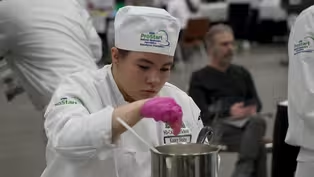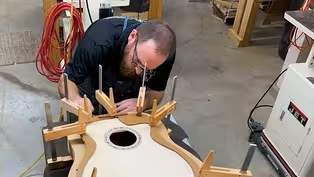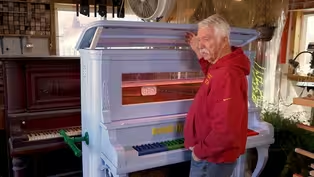
Horses Helping Heroes
Clip: Season 1 Episode 113 | 5m 34sVideo has Closed Captions
Equine-assisted therapy can help veterans and service members find a path toward healing.
Equine-assisted therapy can help military veterans and service members find a path toward healing. In Jester Park, participants gain self-confidence, improve relationship skills and learn emotional regulation.
Problems playing video? | Closed Captioning Feedback
Problems playing video? | Closed Captioning Feedback
Iowa Life is a local public television program presented by Iowa PBS

Horses Helping Heroes
Clip: Season 1 Episode 113 | 5m 34sVideo has Closed Captions
Equine-assisted therapy can help military veterans and service members find a path toward healing. In Jester Park, participants gain self-confidence, improve relationship skills and learn emotional regulation.
Problems playing video? | Closed Captioning Feedback
How to Watch Iowa Life
Iowa Life is available to stream on pbs.org and the free PBS App, available on iPhone, Apple TV, Android TV, Android smartphones, Amazon Fire TV, Amazon Fire Tablet, Roku, Samsung Smart TV, and Vizio.
Providing Support for PBS.org
Learn Moreabout PBS online sponsorship♪♪ Gene Garrett: Horses are different.
They're just, I don't think sometimes people would think that a person could connect with a horse.
Maybe they've never been around horses.
♪♪ Mike McGehee: Seek out the horses.
They'll take care of you.
They're beautiful creatures and they just understand and they'll nudge up to you and just give you a little love nudge and that's a wonderful thing.
But horses, they help people.
Eric Moorman: The horses don't judge you, they don't have any predispositions about anything about you, they're just happy to see you, they just have that connection.
♪♪ Eric Moorman: 2016 the VA contacted the Polk County Conservation Board because they own Jester Park Equestrian Center, to see if they could develop a PTSD, a horse program for therapy to help their patients.
So, since 2016 they've had 300 veterans go through the horse programs out here.
I'm a retired Des Moines Police Officer.
I've been a horse trainer for 40 years, Marine Corp veteran six years, combat, Gulf War.
I have PTSD myself.
So, I'm also working towards getting a first responder program up here that's going to mirror the veterans' program for law enforcement, fire and paramedics.
The Wednesday night co-ed class and the driving classes are open to any veteran, no VA attachment, and they're free to any veteran that wants to come out here.
The Monday morning classes are VA only with the VA therapists.
Most of the veterans that come out here have little to no horse experience.
And so, they're always a little nervous at first and then they kind of hook up to one horse and that's pretty much the horse they're going to be with for the next eight weeks.
So, that's how they form a bond.
You ready for it?
Mike McGehee: Being a Marine combat veteran, I was in the first Gulf War.
My unit punched into Kuwait two days before the ground war started.
We're already fighting two days before the world even knew what was going on.
And we saw a lot, we did a lot and there was some deaths.
I've had a couple of buddies already take their lives.
Five years ago, I suffered a hemorrhagic stroke.
I had a near-death experience.
I crossed over and I came back.
And I was moved into my girlfriend's small ranch and she had horses and I just loved being around them.
It's self-reflection where you might not understand yourself and the horses might understand you better than yourself.
It's a heart-to-heart, it's getting to understand the animal and the body language and just feeling better about yourself.
Let's go to the box over here.
Eric Moorman: Curtis, our driving instructor, he has to be on the cart with them.
It's just like a learner's permit, you're learning how to drive a draft horse, a 2,200-pound animal.
They're very well-trained, but you still want to make sure that you're safe.
Curtis Kentner: After I went through school, I started with the Budweiser Clydesdales and I traveled with them for six years.
And then after that I came here to Iowa here at Jester Park.
The comfort level is something that we really try to help them gain is some confidence around the bigger horses.
If we need to go down a size to one of our ponies we can, but I usually like picking out one horse that is really suitable for that veteran so that way they get to really form a bond with that horse and work off each other's skills.
♪♪ Curtis Kentner: I think the horses play a critical role with the veterans by they can connect on a deeper level than just a human.
So, I can usually tell if the veteran is having a good day or a bad day based on how the horse is reacting.
♪♪ Gene Garrett: I don't know what it is with me but I like it.
And that horse, one day I was talking to my therapist, she was up here, and I knew that I had upset him just because he could tell in the tone of my voice of something I was talking about, and I just went up there and I put my arm up around his neck and I was there petting him, and of course he's such a big fella, he just kind of wrapped his whole head and neck around me like he was giving me a hug.
And it was just, you could feel it.
♪♪ Gene Garrett: I messed up my back really bad, I crushed two vertebrae and I struggle with pain a lot.
It kind of takes your mind instead of being somewhere where you're kind of low and in pain and it's frustrating and this gives me a chance to do something else and to focus on something else and to find out that not everything is bad.
♪♪ Eric Moorman: The whole thing is, is to get stronger, to have a better outlook on life.
You might learn something about yourself.
So, it makes them think of something they might not have thought before.
Gene Garrett: Don't be afraid to try something new.
You might like it.
Video has Closed Captions
Clip: S1 Ep113 | 6m 28s | Over 150 students show off their culinary, management and cake decorating skills. (6m 28s)
Video has Closed Captions
Clip: S1 Ep113 | 5m 56s | Mike Marcovis creates world class electric and acoustic guitars in his Urbandale home. (5m 56s)
Video has Closed Captions
Clip: S1 Ep113 | 5m 34s | Chuck Behm is a retired English teacher who restores pianos out of his home in Boone. (5m 34s)
Providing Support for PBS.org
Learn Moreabout PBS online sponsorshipSupport for PBS provided by:
Iowa Life is a local public television program presented by Iowa PBS














